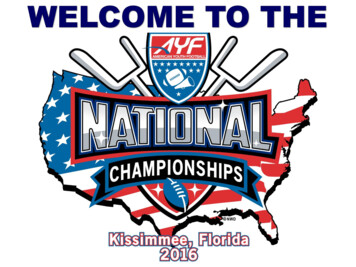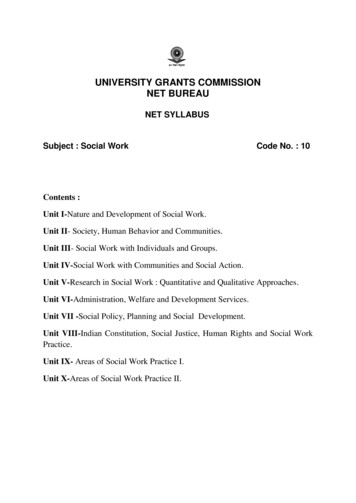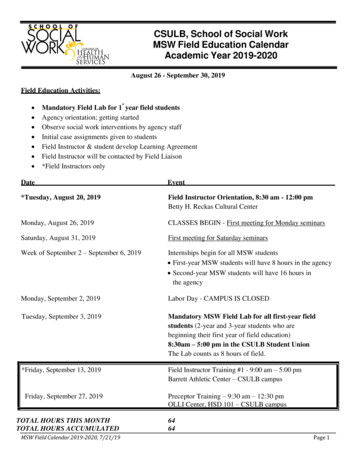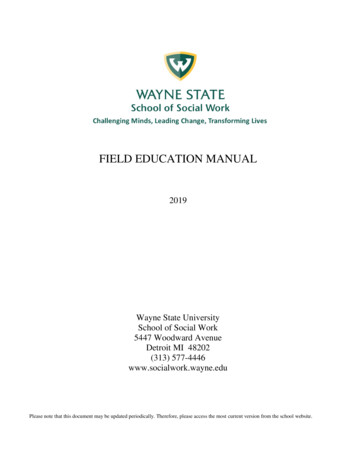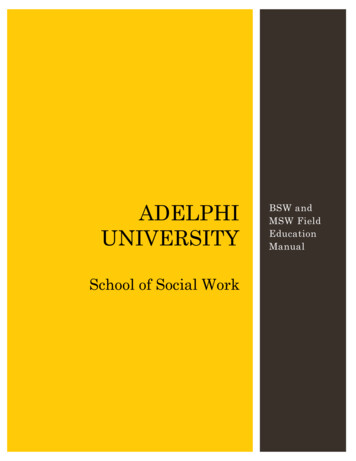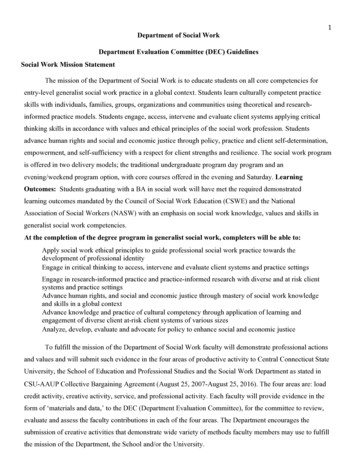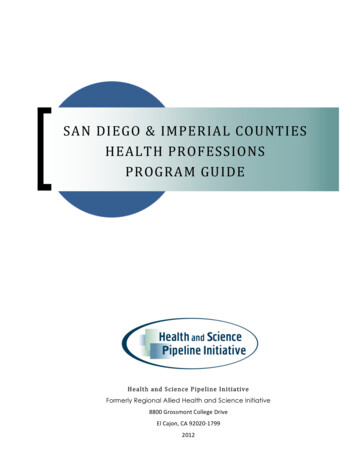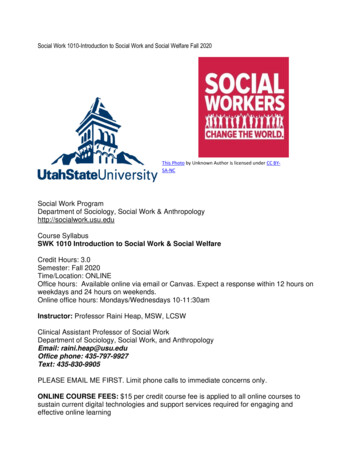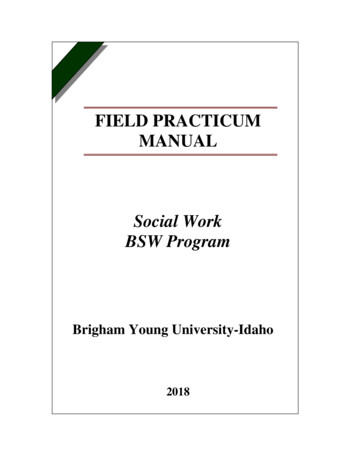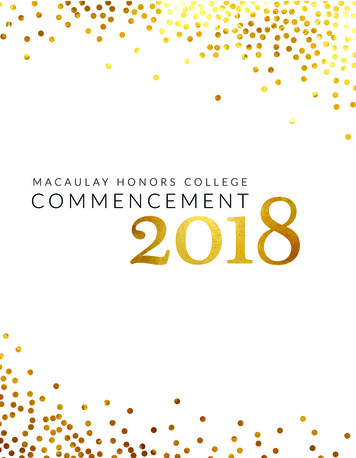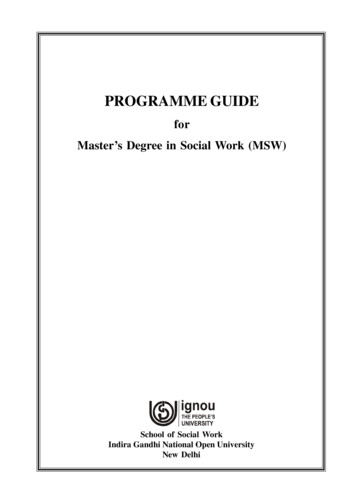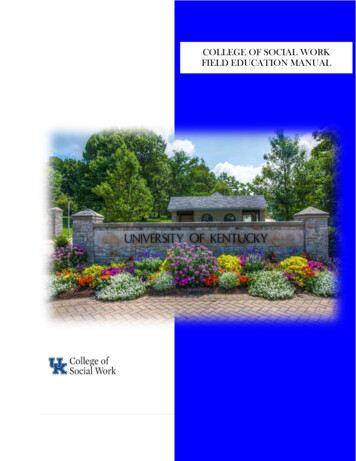
Transcription
COLLEGE OF SOCIAL WORKFIELD EDUCATION MANUAL Page
COLLEGE OF SOCIAL WORK FIELD EDUCATION MANUALTable of ContentsI.Social Work Education at the University of Kentucky 1The University of Kentucky (UKY)UK College of Social Work - Vision & MissionBASW ProgramMSW ProgramCollege of Social Work Centers and LabsArmy/UK MSW Military SpecializationAccreditationII.Field Education Program Overview 3Field Education MissionField Education GoalsField Officce Administrative Descriptions and ResponsibilitiesArmy/UK MSW Field CoordinatorField Advisory GroupIII.Field Education Program Requirements .5Student-Driven Field Placement ModelPre-Planning and Student Placement ProcessTevera Field Management SystemField Education CoursesBASW ProgramMSW ProgramArmy/UK MSW Military SpecializationIV.Field Practicum Roles and Responsibilities . .10Student Rights & ResponsibilitiesDisclosure of Student StatusScope of Practice as a Student LearnerStudent Orientation to the Agencyi Page
Using technology in Social Work PracticeRoles & Responsibilities in Student SupervisionAgency Field InstructorTask SupervisorOff-site/External Field InstructorCourse InstructorV.Placement Agency Partnerships .16Criteria for Approving Field Education SitesField Site Application & Partnership ProcessMonitoring Field Education SitesEmployer-Hosted PlacementsInternational PlacementsVI.Monitoring and Evaluation of Student Performance .19The Learning PlanSite VisitWeekly Social Work SupervisionField Placement SchedulesTime Keeping & Time Report ApprovalStudent Performance EvaluationsGradingField Education Policies and GuidelinesCriminal Background PolicyTransportation of Agency ClientsPersonal SafetyLiability InsuranceHealth & Medical CoverageInclement WeatherPaid Internships & Agency StipendsVII.Field Educations Policies and Guidelines .21Criminal Background PolicyTransportation of Agency Clientsii P a g e
Liability InsuranceSituation Awareness Training and Safety ChecklistPersonal SafetyHealth & Medical CoverageInclement WeatherVIII.Professional Expectations and Placement Changes & Challenges .24Student Behavior ExpectationsPlacement ChangesEmployment OffersAddressing Performance and/or Problematic BehaviorsRequesting Placement SupportSuspension and/or TerminationCoSW Admission, Advising & Student Concern Committee ProcessReturning from Suspension or a period of inactivityPracticum Course WithdrawalFrequently Asked QuestionsCampus Resources & SupportAppendix A: Field Contact Information .30Appendix B: Glossary of Terms . .31iii P a g e
Welcome to Field EducationA Letter From The Assistant Dean And Director Of Field Education & Experiential LearningWelcome to Field Education at the University of Kentucky College of Social Work and the heart of socialwork training. Field Education is where social work skills are realized and refined, and students can leavea positive mark on individuals, organizations, and communities.As you embark on this challenging journey, I encourage you to think beyond yourself, to ask hardquestions, and to be brave and courageous as you apply the knowledge and skills you have gained to realworld settings. It’s no coincidence that the acronym for Field Education & Experiential Learning is FEEL.Field placement is when and where social work students feel their skills sets become activated, feel theirpassions ignite, and feel the strength of their ethics and values take hold as professionals.Everyone here at the UKY CoSW is behind you and here to help remove barriers and support your success.With our agency partners and incredible cadre of field professionals around the country, we aim tosupport you, challenge you, and will help you become a professional social worker who actscompassionately, thoughtfully, and ethically. We are excited to have you apply your learning anddemonstrate your competency while exploring your passions and making a difference in your community!All the best as you take these important steps and Go Big Blue!Jeni Gamble, PhD, MSSWAssistant Dean and Director of Field Education & Experiential LearningClinical Assistant ProfessorCollege of Social WorkUniversity of Kentucky1 Page
I.Social Work Education at the University of KentuckyThe University of Kentucky (UKY)The University of Kentucky is a public, land grant university dedicated to improving people's lives throughexcellence in education, research and creative work, service, and health care. As Kentucky’s flagshipinstitution, the University plays a critical leadership role by promoting diversity, inclusion, economicdevelopment and human well-being.The University of Kentucky: Facilitates learning, informed by scholarship and researchExpands knowledge through research, scholarship, and creative activityServes a global community by disseminating, sharing, and applying knowledgeThe University contributes to the economic development and quality of life within Kentucky's borders andbeyond, nurturing a diverse community characterized by fairness and equal opportunity.UK College of Social Work - Vision & MissionWe will make major contributions to the generation of knowledge that will alleviate contemporary socialproblems as the social work profession enters its second century of service to the nation and the world.By consistently striving for excellence, we will earn entry into the ranks of the foremost schools of socialwork through our research, teaching, and community engagement. We will invigorate the lives of allpeople who join us in this endeavor. We are committed to a renewal of collaborative public service thatis grounded in an intellectual and moral seriousness that reflects the enormous challenges faced by ourglobal community. Such achievements will require individual excellence, effective partnerships, andinnovative solutions. This vision is the hallmark of our college.The University of Kentucky College of Social Work (CoSW) promotes community and individual well-beingthrough its translational research and scholarship, exemplary teaching, and vital community engagement.The College is committed to the people and social institutions throughout Kentucky, the nation, and theworld. The College, like the University, is an organization that cultivates a diverse academic communitycharacterized by interpersonal fairness and social justice. The College is fiercely committed to developingoutstanding social work professionals and scholars - leaders who will serve individuals, families, andcommunities through innovative and effective practices that are guided by cultural competency,systematic ethical analysis, and a keen and pragmatic understanding of the human condition.BASW ProgramThe BASW Student Handbook and other student resources can be found on the College website. TheBASW Curriculum and Program Models are in the BASW Student Handbook.MSW Program2 Page
The MSW Student Handbook and other student resources can be found on College website. The MSWCurriculum and Program Models are in the MSW Student Handbook.College of Social Work Centers and LabsInformation on the College’s unique centers and labs can be found on College website.Army/UK MSW Military SpecializationThe Army/UK MSW Military Specialization is located within the US Army Medical Department Center andSchool (AMEDDC&S), Health Readiness Center of Excellence (HRCoE). The AMEDDC&S HRCoE is locatedat Joint Base San Antonio Fort Sam Houston, Texas. The AMEDDC&S is where the Army MedicalDepartment formulates its medical organization, tactics, doctrine, and equipment. The AMEDDC&S is alsowhere the Department of Defense (DoD) educates and trains medical personnel from all the armedservices, to include service members of the Navy, Air Force and DoD civilians.AccreditationThe Bachelor and Master programs in the College of Social Work conform to the structure and guidelinesof the Council on Social Work Education (CSWE). The BASW and MSW programs have maintained CSWEaccreditation and reaccreditation since their inception. The BASW and MSW programs employ the CSWEcompetencies and practice behaviors as student learning outcomes.II.Field Education Program OverviewField Education MissionThe mission of Field Education is to provide mutually supportive and positive learning environments thatcultivate leadership, increase knowledge, refine skills, and strengthen social work values in student internsas they develop proficiency in the social work core competencies in preparation for professional practice.Field education is the signature pedagogy of the social work educational experience, as stated by theCouncil on Social Work Education. Field creates the opportunity for integration of theory and classroomknowledge with practice environments for skill development and competency demonstration.Field Education GoalsThe intent of field education is to connect the theoretical and conceptual contribution of instruction thatoccurs in the classroom with the practical world of the practice setting. The two interrelated componentsof curriculum, classroom learning and field education, are of equal importance within the curriculum, andeach contributes to the development of the requisite competencies of professional practice. Fieldeducation is systematically designed, supervised, coordinated, and evaluated based on criteria by whichstudents demonstrate the achievement of program competencies. (CSWE Educational Policy 2.2).The primary goal of Field Education is to prepare graduates who are committed and knowledgeable aboutimproving the quality of life for vulnerable individuals, families, groups and communities, locally,3 Page
nationally and internationally. Undergraduate students are prepared for generalist practice by coursework built upon a liberal arts perspective and the generalist social work curriculum. This preparation helpsstudents develop their problem-solving capabilities, critical thinking skills, writing skills, andcommunication skills, and occurs in their foundation-level practicum.First year graduate students prepare for the advanced practice curriculum through the development offoundation social work competencies. Second year graduate students build upon their foundation-levelcompetencies through the advanced-level practice curriculum and may choose areas of special study tofurther their knowledge and skills for advanced practice. Second year graduate students may alsoparticipate in specialized certificate programs.Field Office Administrative Descriptions and ResponsibilitiesThe Field Education Program is managed by a Assistant Dean and Director of Field Education andExperiential Learning. The Field Education team is comprised of multiple members, the Director of FieldEducation, Assistant Director of Field Education, Field Coordinators, and online student service personnelteamAssistant Dean and Director of Field Education & Experiential Learning: The CoSW facultymember who provides educational and administrative leadership for the field education programin both the BASW and MSW programs, and for overall CoSW success.Assistant Director of Field Education: The CoSW faculty member who provides educationalleadership for field courses and supports field operations.Field Coordinator: CoSW field team members who advise students and support placementcoordination in the BASW and MSW program, and provide field orientations and field guidancefor BASW and MSW students.Army/UK MSW Field Coordinator: The CoSW staff member who advises students and coordinatesplacements in the Army/UK MSW Military Specialization located at Fort Sam Houston, Texas.Field Advisory Group: The Field Advisory Group for the College of Social Work and an AdvisoryGroup at the Army/UK MSW Military Specialization campus serve in an advisory capacity to theDirector of Field Education and the Field Education Program.Field Advisory Group functions include: Promote communication with and among faculty, students, practicum professors/instructors,alumni, and the public to support the Field Education ProgramReview curriculum changes in the field program and identify ongoing field instructor trainingneedsServe as an avenue for feedback to the College regarding various community needsBring social justice and cultural sensitivity to bear on the Field Education Program4 Page
III.Field Education Program RequirementsCareful planning with academic advisors will ensure that students have the necessary prerequisitescompleted for beginning field work. Students should expect to engage in the field planning and guidanceprocess as soon as possible in the semester prior to their scheduled field experience, typically ensuing inlate January/February for summer and fall field courses, and in late September for spring field courses.The Field Education Program utilizes Tevera, an online Field management system and all students mustregister for Tevera. Tevera requires a one-time registration fee that can be purchased directly throughTevera or at the UK Bookstore. It can also be utilized following graduation for job searches and licensingpurposes. Complete information on Tevera is located on the field website and in the BASW and MSWStudent Field Orientation modules in Canvas. Quick Reference Guides are also available for step-by-stepfunctional guidance.Those enrolled in the Army/UK MSW Military Specialization located at the Fort Sam Houston campus willcomplete an additional field course, for a total of four semesters of field education. Those field educationexperiences will be exclusively set up by the Fort Sam Houston field coordinator due to program locationand requirements. *Fort Sam Houston campus students do not use Tevera.When students begin a practicum course, time management is essential and must be managed carefullyto ensure fulfillment of all responsibilities. Occurring simultaneously with field agency placement,students enrolled in SW 444, SW 445, or SW 640 participate in an integrative field seminar course, withoptional seminar sessions available for SW 740 and SW741.All students will be required to complete field education assignments related to the requisite CSWECompetencies and behaviors as described in the course syllabus provided by the Course Instructor.Assignments include learning plans, time sheets, midterm and final evaluations. Failure to complete thesekey assignments, and/or failure to participate in the seminar (when required), can result in a studentearning a lower grade or possibly failing the practicum course, despite satisfactory performance in thepracticum agency and completing hour requirements.The final course grade will include completion of the required number of agency hours, the agency FieldInstructor's evaluation of student performance in practicum, and completion of practicum courseassignments, and seminar participation when required.IMPORTANT NOTE: The College of Social Work does not grant social work course credit for life experienceor previous/current work experience. All field education credits must be earned through enrollment in theCollege’s field education courses.Student-Driven Field Placement ModelAll students are responsible for identifying potential placement agencies, arranging and conducting preplacement interviews, notifying agencies of their final site selection, and confirming the placementTevera. The Field Education Program has developed on-going relationships with agencies and may assiststudents to find placements that may also result in a good fit for both the agency and the student. TheTevera field management system is used to maintain, coordinate, and deliver field activities.5 Page
Course Instructors for foundation field courses teach integrative field seminars based on the theoreticalunderpinnings of the students’ course work, connecting theory and practice. Seminar sessions provide anopportunity for the instructor to learn about practice issues and potential challenges that studentsencounter in the field and assist in navigating those situations. Students learn valuable lessons from oneanother and from the seminar content and stay informed on approved agency options through directagency contact and student monitoring. Course Instructors serve as liaisons for the students in theirseminar sections. Advanced field courses do not include required seminar sessions, but students mayengage in optional seminar sessions.The Assistant Dean and Director of Field Education and Experiential Learning (ADDFEEL) works closely withinstructors to ensure that consistency of expectation exists across field sites and course sections. Inaddition to individual meetings and consultation with Course Instructors, group meetings are held eachsemester with part-time instructors in the field education program. The ADDFEEL, field team, and fellowdirectors address issues that arise regarding curriculum, pedagogy, and University and College academicpolicies.Pre-Placement Planning and Student Placement ProcessAll BASW and MSW students beginning their first practicum are required to participate in the Canvas FieldOrientation and can engage in guidance sessions in the semester prior to beginning their practicum.Students are introduced to the CoSW and CSWE requirements for practicum, and the CoSW requirementsand procedures for practicum placement in the Canvas Field Orientation. Field guidance sessions areconducted by field coordinators and are available upon request and guidance materials are available.During the pre-planning process, students register for Tevera and complete their Student Field DetailsForm in Tevera. This information is used to assist students in determining what type of field sites wouldbe suited to their educational goals and professional growth. Students initial field placements occur in SW444 and SW 640.The CoSW maintains a searchable database with agency information for each approved agency in Tevera.Field agency information is continuously updated and is accessible to students and agency and fieldInstructors within Tevera. This database allows students to search with a variety of specifics such as typeof population services, location, or by specific institutions.Students in field education courses may contact any approved agency in Tevera for a pre-placementinterview or request pre-placement guidance and assistance from a field coordinator throughout theirdegree program. Students may complete their field placements in the same agency for foundation andadvanced levels or be hosted by different agencies, as well as complete their field placement with theiremployer when appropriate. Students are encouraged to consider their learning needs, lifecircumstances, and the depth and breadth of their skill development when determining their placementapproach.*MSW Military Specialization students located at Ft. Sam Houston will be assigned a Course Instructorwho will conduct conferences with the students' placement agencies to review and discuss the studentlearning plans, agency learning opportunities, field education requirements, and student performanceevaluations6 Page
Tevera Field Management SystemThe CoSW Field Education Program uses the Tevera online field management system, which assistscolleges with the complex issues associated with managing student interns in their field placements. It isa valuable tool for students to begin researching prospective agencies for their practicum placements andprovides students with access to descriptive information about agencies and learning opportunities. Allstudents, Course Instructors, and agency field supervisors are provided registration information andguidance in using Tevera. Quick Reference Guides for Tevera are available for students, Field Instructors,and Course Instructors.The CoSW uses Tevera for the following: Provide secure, online access to pertinent field placement information for students, CourseInstructors, agency field instructors, and the field team. Update and expand the placement agency database for current and future student access. Communicate directly to students and advise them regarding field placements based on relevantinformation on student and agency detail pages. Maintain accurate and timely information on individual student placements in the field.Students use Tevera for the following: Search for potential practicum agencies Confirm their agency and agency Field Instructor Track practicum hours and run time reports for Field Instructor approval Develop and submit learning plan, midterm and final field evaluations, and other programassessments. Provide access to your agency field instructor/supervisor for time tracking reports, learning planand field evaluations. Postgraduate utilization for licensure and CEU tracking and job searching.*Army/UK MSW Military Specialization students at Ft. Sam Houston do not use the Tevera system, pleasesee your local field placement coordinator for guidance.Field Education CoursesBASW ProgramUndergraduate students must complete two semesters of field education courses, SW 444 and SW 445,with SW 444 traditionally completed in the fall of their 3rd year and SW 445 in the fall of their 4th year.Field engagement during these courses may occur in different agencies or in the same agency. Studentsthat would benefit from completing SW 444 and SW 445 in consecutive semesters should discuss thisoption with their academic advisor. At the successful conclusion of SW 445, BASW students will have met7 Page
the CSWE field requirements for 400 hours of agency engagement and their Foundation-level fieldplacement.SW 444 Educational Practicum IThis course is an introduction to social work field education. Students will begin to apply knowledge fromprerequisite courses in experiences that utilize social work practice skills with emphasis on individuals,families and small groups, toward goals of prevention, restoration and enhancement of social functioning.This course is open only to social work majors and includes a weekly seminar class and 200 hours ofexperiential learning and agency engagement. Students should expect to spend 12-15 hours a weekengaging with their practicum sites when completing the course.SW 445 Educational Practicum IIThis course continues the process of social work practicum. Students will continue to apply knowledgefrom prerequisite and concurrent courses in experiences which utilize social work practice skills withindividuals, families, and small groups as well as with organizations and communities toward the goals ofprevention, restoration, and enhancement of social functioning. This is open only to social work majors.and includes a weekly seminar class, and 200 hours of experiential learning and agency engagement.Students should expect to spend 12-15 hours a week engaging with their practicum sites.MSW ProgramGraduate students enrolled as Regular Standing (RS) students in the 60-hour MSW program completethree semesters of field education courses, SW 640, SW 740, and SW 741. Students enrolled as AdvancedStanding (AS) students in the 30 hour MSW program will only complete two semester of field education,SW 740 and SW 741. Students may complete SW 640, SW 740 and SW 741 in the same agency or withseparate agencies, if the agency provides appropriate learning activities for both foundation andadvanced-level placements, with SW 740 and SW 741 designed to be completed within the same agency.SW 640 MSW Foundation PracticumStudents in this course engage in a generalist social work field placement under the direction of a CourseInstructor and an agency Field Instructor. Through field education seminars, students integrateknowledge, skills and behaviors from prerequisite and concurrent courses to demonstrate foundationlevel social work practice with individuals, families, small groups, organizations and communities. Thefocus includes attention to policy, ethical considerations, the application of theory, and the use ofresearch-informed interventions. The course requires 300 hours of engagement per semester; 25 of the300 total can be completed through seminar with the remaining 275 completed through agencyexperiential learning. Students should expect to spend 16-20 hours a week in their practicum agencies.*Course completed by Regular Standing students onlySW 740 MSW Advanced Generalist Practicum IThis advanced level practicum builds on foundation practicum and foundation level courses and preparesstudents to practice as social workers at the advanced level in public and private settings. The advancedgeneralist practicum focuses on the application of theory, knowledge, and skills, and integrates the socialwork competencies developed in the advanced curriculum year with practice experience in communitybased agencies. Students can choose areas of specialization and engage in agencies that provide servicesin that area. The course requires 300 hours (RS)/250 hours (AS) in an agency and students should expectto spend 16-20 hours a week engaging with their agencies. Prerequisite: SW 640 or enrolled in theAdvanced Standing MSW program.8 Page
SW 741 MSW Advanced Generalist Practicum IIThis advanced level practicum builds on the SW 740 advanced practicum and the foundation practicumand prepares students to practice as social workers at the advanced level in public and private settings.The advanced practicum focuses on the application of theory, knowledge, and skills, and integrates thesocial work competencies developed in the advanced curriculum year with practice experience incommunity-based agencies to address complex needs and problems. Students may also choose areas ofspecialization, and engage in community-based agencies that provide services in that area ofspecialization. The course requires 300 hours (RS)/250 hours (AS) of engagement per semester in anagency and students should expect to spend 16-20 hours a week engaging with their agencies.Prerequisite: SW 740Army/UK MSW Military Specialization *Open to Fort Sam Houston program participants onlyStudents must complete four field practicum courses and complete a minimum of 250 supervised traininghours during each. Seminar classes and related learning experiences approved by the field coordinatormay count toward the total hours. Students should expect to spend approximately 36 hours a week in theagency practicum setting, and 3 hours in seminar for 14 consecutive weeks.SW 640Students in this course engage in a generalist social work field placement under the direction of a facultypracticum professor and an agency field instructor. Through a three hours per week field educationseminar, students demonstrate their ability to integrate their knowledge, skills, and behaviors fromprerequisite generalist practice courses that addressed social work practice with individuals, families,small groups, organizations and communities in a military and community-based setting. The seminaralso focuses on the importance of policy, ethical practice, theory application, and the use of researchinformed interventions.SW 641Students in this course engage in a generalist social work field placement under the direction of a facultypracticum professor and an agency field instructor. Through a three hours per week field educationseminar, students demonstrate their ability to integrate their knowledge, skills, and behaviors fromprerequisite generalist practice courses that addressed social work practice with individuals, families,small groups, organizations and communities in a military and community-based setting. The seminaralso focuses on the importance of policy, ethical practice, theory application, and the use of researchinformed interventions.SW 740This specialized practicum course builds on the generalist practicum courses and prepares students topractice as social workers at the advanced level in a military setting. The specialized practice practicumfocuses on the application of theory, knowledge, and skills, and integrates the social work competenciesemphasized in the specialized practice curriculum with practicum experience in civilian and militaryagencies to address complex client needs and problems. This course includes a three hours per weekseminar that reinforces students’ experiential learning.SW 741This specialized practicum course builds on the generalist practicum courses and prepares students topractice as social workers at the advanced level in a military setting. The specialized practicum focuses9 Page
on the application of theory, knowledge, and skills, and integrates the social work competenciesemphasized in the specialized practice curriculum with practicum experience in civilian and militaryagencies. This course includes a three hours per week seminar that reinforces students’ experientiallearning.IV.Field Practicum Roles and ResponsibilitiesStudent Rights & ResponsibilitiesThe student, with the support of the Course Instructor and agency field instructor, has the mainresponsibility for their own learning and is expected to actively participate in the development andimplementation of the field instruction experience. During the field placement, the student isexpected to maintain the same ethical standards and practices as professional staff.Student specific requirements include the following:a) Attend required Field Education Information sessions for foundation and advancedb)c)d)e)f)g)h)i)j)placements and follow all field placement instructions in a timely fashion. This may includediscussion with field coordinators of appropriate placement choices.Make their Field Instructor aware of any pertinent information that may affect the student'sability to learn.Advocate for self in pursuit of learning. The student is responsible for the discussion with theirField Instructor and the initial dr
placements in the Army/UK MSW Military Specialization located at Fort Sam Houston, Texas. Field Advisory Group: The Field Advisory Group for the College of Social Work and an Advisory Group at the Army/UK MSW Military Specialization campusserve in an advisory capacity to the Director of Field Education and the Field Education Program.
